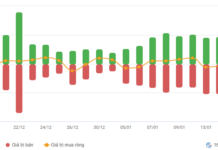In a discussion with a security expert from VPBank, the specialist revealed that in their efforts to help customers minimize the risk of financial loss due to fraudulent transactions, the bank has initiated the creation of a “blacklist” of suspected scam accounts within their system.
“We are collaborating with A05 (the High-Tech Crime Prevention and Control Department under the Ministry of Public Security), along with NAPAS, to develop a comprehensive database of fraudulent and scam accounts. Whenever a customer attempts to transfer money to one of these accounts, we will issue a warning, and for accounts we are certain are fraudulent, we will block the transaction,” the expert shared.
In the near future, this database of flagged scam accounts is expected to be expanded on an inter-bank level, providing enhanced protection for customers across the banking system and reducing the risk of falling prey to scam or erroneous transactions.

VPBank NEO offers automatic alerts and blocks transfers to suspected scam accounts
Currently, the ideal timeframe for banks to freeze funds that have been mistakenly or fraudulently transferred to scam accounts is one day. This emphasizes the importance of customers promptly reporting such incidents to their bank and the authorities as soon as they are discovered.
VPBank is among the first in the industry to proactively build a blacklist of scam accounts, send alerts, and automatically block transfers to these accounts. This solution is considered a significant step forward in safeguarding users of banking apps against sophisticated scams perpetrated by cybercriminals, especially given that individuals often lack vigilance regarding well-known scam techniques.
For instance, a resident of Dan Phuong district in Hanoi was recently tricked into installing a fake VNeID software. Posing as a police officer, the scammer instructed the victim to transfer money to a specified bank account as a ‘file fee.’ After scanning the QR code for facial recognition and providing the OTP, the victim discovered that their bank account had been depleted of VND 1 billion.
The installation of fake software, as in this case, poses a severe risk of personal phone hijacking, personal information exposure, and financial loss from associated bank accounts.
Beyond the continuous introduction of security measures by banks, many experts in the field emphasize the crucial role of customer awareness and education. VPBank’s specialist advised that customers should take responsibility for their digital safety by adopting secure practices when using banking apps.
Firstly, users should create strong passwords to prevent unauthorized access attempts by fraudsters who may gather personal information from various sources. Additionally, implementing biometric authentication for login and transaction verification adds an extra layer of security, as an individual’s biological traits are unique and challenging to replicate.
To further enhance the security of banking apps and mobile devices, users are encouraged to update their software and app versions regularly. It is also imperative not to click on unfamiliar links, scan unknown QR codes, disclose OTP codes, or store passwords on mobile applications.
“In the unfortunate event of experiencing a scam, personal data breach resulting in financial loss, or device hijacking, customers should immediately lock their bank account, change their banking app password, and contact the bank’s customer support,” the VPBank expert advised. “Subsequently, it is essential to block associated accounts and delete recent login sessions to prevent further damage while cooperating with the bank and investigative authorities.”
In addition to blocking transfers to suspected scam accounts, banking applications like VPBank NEO offer advanced security features such as vulnerability alerts, biometric authentication for new or unfamiliar device logins, and protection against potential malware infections or unauthorized access attempts on users’ mobile devices.





































